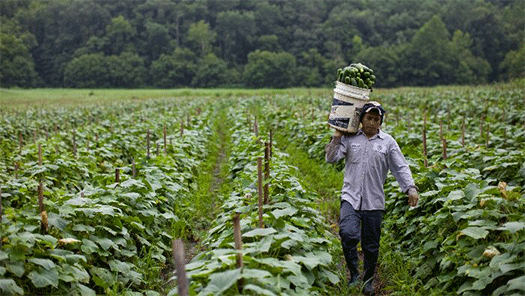Gerlinger Lounge, 1468 University St.
Passover-friendly refreshments will be served
Organized by Julie Weise, 2018-19 Wayne Morse Resident Scholar
In the United States and across Europe, nation-states are slamming their doors on immigrants and refugees. This nationalist reaction to the diversity that globalization has brought seems to portend depressed immigration levels for the foreseeable future. Yet employers still demand immigrant labor in a growing economy. Even as U.S. President Donald Trump’s anti-immigrant rhetoric and policies drove undocumented workers deeper into the shadows, his administration also approved a record-breaking quarter-million temporary agricultural worker visas, known as H2A or “guestworkers.” Similar patterns are in effect around the globe.

In this panel, historians join key Oregon advocates for both agricultural and workers’ interests to contextualize the “guestworker” phenomenon locally and globally, and ask whether it represents the future of immigrant labor in the United States and beyond.
Panelists
Michael Dale is the founder and executive director of the Northwest Workers’ Justice Project, and non-profit law firm that represents low wage, immigrant and contingent workers with respect to civil employment law problems. He worked for 25 years as an Oregon legal aid attorney, and helped establish the Oregon Law Center in 1995. Over the last ten years he has been engaged in extensive litigation over the rules governing the use of H-2B temporary workers, winning cases in the 3rd, 11th and 4th Circuit Courts of Appeals.
Christoph Rass is one of Germany’s leading historians of twentieth-century European labor migration. A professor at Osnabrück University’s Institute for Migration and Intercultural Studies, Rass concentrates on institutions and knowledge production in migration regimes, forced migrations, and GIS-based modeling of migration patterns. Rass is a recent recipient of the Kalliope Prize for Migration Research from the German Emigration Center.
Jeff Stone is the CEO of Oregon Association of Nurseries and formerly Chief of Staff to Metro Council. Stone has a BS from the UO in political science and has deep experience in Oregon and national political affairs. He has served as an executive and board member of numerous business and nonprofit organizations.
Julie M. Weise is a scholar of twentieth-century Mexican migration history in global context. An associate professor of history at the University of Oregon, Weise is the author of the prize-winning Corazón de Dixie: Mexicanos in the U.S. South since 1910 (UNC Press, 2015). Her current book project, “Citizenship Displaced: Migrant Political Cultures in the Era of State Control,” places postwar Mexican migration history in conversation with parallel histories in Europe and southern Africa.
Cosponsored by the UO Office of International Affairs, the UO Department of History, and the Global Studies Institute’s Global Oregon Faculty Collaboration Fund. Part of the Wayne Morse Center’s 2017-19 theme, Borders, Migration, and Belonging. The Wayne Morse Center for Law and Politics encourages civic engagement and inspires enlightened dialogue by bringing students, scholars, activists, policymakers, and communities together to discuss issues affecting Oregon, our nation, and the world.
